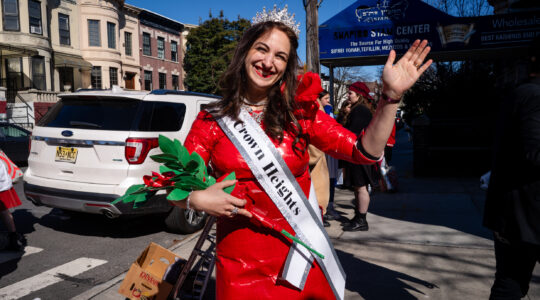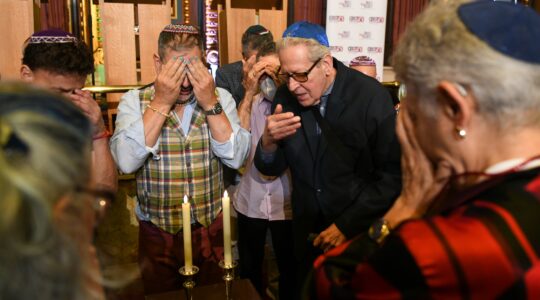In November, I got so sick that I almost didn’t notice that Chanukah was approaching. The only Festival of Lights it looked like I would experience would be the lights on my I.V. machine as it dispensed various antibiotics and fluids.
My holiday would be spent in a snap-up gown and hospital booties, rather than dressed up in my Shabbat finery celebrating with my wonderful congregation. It was hard to reconcile myself to the role of patient when I was so used to taking care of others.
It was easy to get angry at God – why was I there? What was going on with me? Why was I forced to miss both Thanksgiving and Chanukah with family and friends?
These questions were not rhetorical. For a long time, nobody knew what was wrong. It started like a run-of-the-mill stomach flu, so I really didn’t make anything of it. But, soon, I noticed that I was losing weight and feeling more and more dehydrated. I had less and less energy. I also developed severe abdominal pain. After about two weeks, I knew it was time to find out if something more was going on.
I went to the local emergency room, and was admitted so that the dehydration and pain could be addressed and a cause for this could be identified.
Over the next week, each test and scan came back negative. Negative test results are a mixed bag.
On one hand, there is an enormous sense of relief and knowing that some diseases, disorders and parasites have been eliminated as possibilities. On the other hand, I found myself with a growing sense of frustration as my doctors and I struggled to figure out what was going on.
I wasn’t at home in my synagogue, and that hurt. But God was present in the people around me. One congregant, knowing that lit candles are prohibited in the hospital, offered to bring me an electric menorah. I felt that God was reminding me that there could still be light in our times of darkness. It might not be the light that we had imagined or originally hoped for, but it could still be found.
My husband, Seth, also showed me God’s presence. He was by my side every single day, all day. He kept me entertained while I was awake, and he was there when I slept. He asked the doctors astute questions about my condition, and he made sure that I was tended to at all times. As he held my hand, I was grateful that I had been blessed with such a caring, giving soul mate.
And then, finally, the diagnosis came back: I had a bacterial infection known as Clostridium Difficile (or C. diff for short). Finally, my illness had a name, and, presumably, a path toward recovery. With antibiotics and rest, I was told that I could beat it pretty easily.
I'm finally back at work, but I’m still battling C. diff. I have had three recurrences, which, unfortunately, is not uncommon. C. diff is a nasty bacteria that loves to wreak havoc in your intestines and destroy all the good bacteria in that region.
I’m not getting better; I’ve grown increasingly impatient and demoralized and I miss feeling well. I have become scared of touching people, lest I get them sick or they give me something else. The meds keep me from feeling totally present, and I’m still very tired much of the time. That makes me miss my “spark” – that part of me that gives me vitality and an appetite for life. I yearn for those times when I could put my own strength so easily at the service of others.
I also spend way too much time in and around the bathroom, as well as thinking about various bodily functions. So I’ve been thinking a lately about our morning prayer, Asher Yatzar, also recited after a successful trip to the loo. My congregants and I always smile about that.
In it, we praise God “who formed the human body with skill, creating the body’s many pathways and openings. It is well known before Your throne of glory that if one of them be wrongly opened or closed, it would be impossible to endure and stand before You.”
I have a new understanding of how hard it is to endure and stand before God (or anyone, really) when things are not going right in your body. Now I know that this prayer, also said to celebrate our bodies’ miraculous functioning, also validates how challenging illness is, and how much it keeps us from living our lives in the way we hope.
I am thus sending out a prayer of healing to all who are currently ill, and who are finding it difficult or impossible to stand up and praise God right now. I pray that you will all return to health and experience a complete healing of mind, body, and spirit. And, if you happen to have an extra prayer to offer on my behalf, I’ll gratefully take one of those, too.
Rabbi Marci Bellows is a spiritual leader at Temple B'nai Torah community in Wantagh, Long Island. A native of Skokie, IL., she earned a B.A. in Psychology from Brandeis University and a Masters in Hebrew Literature in 2003 from Hebrew Union College-Jewish Institute of Religion. She was ordained in 2004.
The New York Jewish Week brings you the stories behind the headlines, keeping you connected to Jewish life in New York. Help sustain the reporting you trust by donating today.




